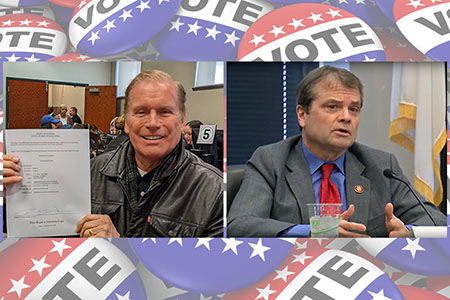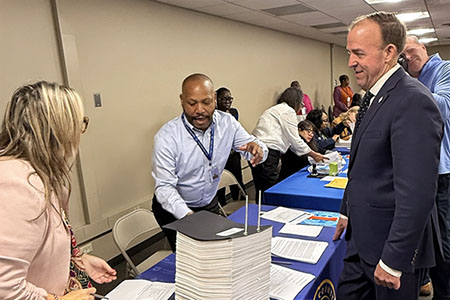
Second of two articles on changes in real estate brokerage commissions.
Apr. 7, 2024 – Gone are the days when a simple handshake and a winsome smile could solidify a working agreement between a buyer and a real estate agent.
These agreements are typically referred to as a Buyer Broker Agreement or an Exclusive Buyer Broker Representation Agreement. (In Florida, there are no less than five different types of buyer broker agreements.) Before would-be real estate buyers jump into a transaction, Benson, a CRB, ABR, and buyer brokerage veteran for more than three decades, advises they ask the broker how many buyers they have exclusively represented in their real estate purchases. They should also ask for at least three buyer broker references. Buyer Broker Agreements are ‘win-win’ for buyers and real estate professionals According to Benson, Buyer Broker Agreements assist in building trust and a mutually beneficial relationship. “They promote transparency through up-front conversations, and provide clarity regarding services buyers can expect to receive, as well as how their real estate professional will be compensated,” Benson said. “This transparency is crucial for consumer education during one of the biggest purchases many people make in their lifetime.” The Buyer Broker Agreement should include the following key objectives: 1 Ensure the buyer has a true and loyal advocate representing them in their transaction. 2 Help the buyer understand their agent’s representation and the duties owed to them. 3 Allow buyers to ask questions about how their agent is compensated, including who is responsible for the payment of services. 4 Most importantly, reveal whether the agent will ask permission to be – or practice as – a “Dual Agent.” Here is how Josh McKnight, a Pennsylvania real estate agent, describes the role of the buyer’s agent: “A buyer’s agent has a fiduciary responsibility to their client, the buyer, to make sure that they understand the language in the contract and make sure they’re buying a home that fits their needs.”
Buyer Broker Agreements should include the following: Confidentiality. Are you famous? Or just the next-door neighbor? Identity protection should be included in a Buyer Broker Agreement, if desired or needed. Agreement term. Three months is recommended with a renewal option. One year is too long, but 30 days is often too short. Property description. This paragraph should clearly state what kind of property you are looking for and the general price range. Agent duties. Exclusive is best. Insist on the complete legal fiduciary duties of loyalty, obedience, accounting, confidentiality, reasonable skill, care, and full disclosure. Buyer duties. Exclusive is best. Direct all inquiries to your buyer broker. Compensation. This may be a percentage of the transaction amount or a flat fee. At the buyer’s direction, compensation may be paid by the seller (financed by the buyer) whenever possible. Notwithstanding local customs, compensation to the buyer’s broker should not be paid through the listing brokerage. Dual Agency status. Just say no. Cancellation. The agreement should be mutually cancellable by either party with a defined number of days’ written notice. Termination fees. Avoid them, unless the broker has specific out-of-pocket expenses associated with the anticipated purchase. Retainer fees. Reputable buyer brokers routinely request a modest retainer fee. Some buyer brokers – with power-of-attorney to purchase on behalf of the buyer – maintain separate escrow accounts to hold the buyer’s earnest monies. The funds will be credited toward the buyer’s down payment at closing. These brokers may routinely write contracts on the buyer’s behalf – subject to the buyer’s permission and approval – using the earnest money funds. “Working with a professional who legally represents you and looks out for your best interests – throughout the entire home purchase process – is an exciting and extremely good thing,” Benson said. It’s certainly possible to buy a home without the representation of a buyer’s agent, Benson explains, but in a competitive market where things change rapidly, you’ll be glad to have a knowledgeable advocate on your side. If you trust and like your broker, and your intuition tells you it’s a good fit, it likely will be. Remember, it’s not a marriage proposal, but your buyer broker wants to “go steady” with you – and does not want you to date anyone else.
Buyer Broker Questions What is a buyer’s broker? A broker with whom a buyer contracts to represent him or her in a real estate purchase. What is a seller’s broker? A broker with whom the seller contracts to represent him or her in the sale of his or her real estate. What is a dual agent? A broker who “represents” both the buyer and the seller in the same transaction. However, a dual agent cannot fully represent either party. It is illegal not to disclose the dual-agency relationship. There is an inherent conflict of interest because the seller wants the highest price, and the buyer wants the lowest price. Dual agency benefits the real estate agent at a high cost to the consumer. What is a fiduciary relationship? A relationship of trust and fidelity. Real estate brokers owe a duty of undivided loyalty to their clients. The real estate broker must exercise the utmost good faith, care, confidentiality, and full and fair disclosure at all times. Dual agents cannot act as full fiduciaries. For more information on Buyer Brokerage Agreements, NAR has recently published a brochure about “all the things big and small that a REALTOR may do to help clients when buying a home...” |
















